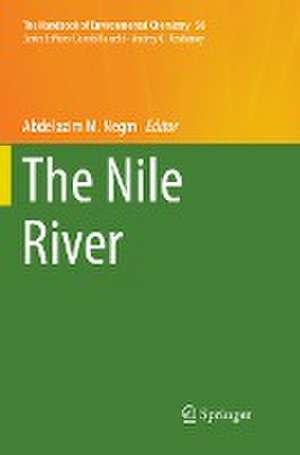The Nile River: The Handbook of Environmental Chemistry, cartea 56
Editat de Abdelazim M. Negmen Limba Engleză Paperback – 4 aug 2018
| Toate formatele și edițiile | Preț | Express |
|---|---|---|
| Paperback (1) | 1946.48 lei 6-8 săpt. | |
| Springer International Publishing – 4 aug 2018 | 1946.48 lei 6-8 săpt. | |
| Hardback (1) | 2769.78 lei 6-8 săpt. | |
| Springer International Publishing – 13 iun 2017 | 2769.78 lei 6-8 săpt. |
Din seria The Handbook of Environmental Chemistry
- 18%
 Preț: 1819.46 lei
Preț: 1819.46 lei - 18%
 Preț: 1827.32 lei
Preț: 1827.32 lei - 18%
 Preț: 2102.76 lei
Preț: 2102.76 lei - 18%
 Preț: 2089.35 lei
Preț: 2089.35 lei - 18%
 Preț: 2481.57 lei
Preț: 2481.57 lei - 18%
 Preț: 1223.43 lei
Preț: 1223.43 lei - 5%
 Preț: 1419.56 lei
Preț: 1419.56 lei - 15%
 Preț: 639.41 lei
Preț: 639.41 lei -
 Preț: 392.97 lei
Preț: 392.97 lei - 5%
 Preț: 366.56 lei
Preț: 366.56 lei - 18%
 Preț: 1826.69 lei
Preț: 1826.69 lei - 15%
 Preț: 640.71 lei
Preț: 640.71 lei - 18%
 Preț: 728.91 lei
Preț: 728.91 lei - 5%
 Preț: 1424.89 lei
Preț: 1424.89 lei - 18%
 Preț: 1225.94 lei
Preț: 1225.94 lei -
 Preț: 386.00 lei
Preț: 386.00 lei - 18%
 Preț: 732.70 lei
Preț: 732.70 lei - 15%
 Preț: 641.53 lei
Preț: 641.53 lei - 5%
 Preț: 1416.81 lei
Preț: 1416.81 lei - 15%
 Preț: 644.82 lei
Preț: 644.82 lei - 5%
 Preț: 1421.76 lei
Preț: 1421.76 lei -
 Preț: 386.39 lei
Preț: 386.39 lei -
 Preț: 389.49 lei
Preț: 389.49 lei - 5%
 Preț: 719.02 lei
Preț: 719.02 lei - 5%
 Preț: 714.63 lei
Preț: 714.63 lei - 18%
 Preț: 1215.22 lei
Preț: 1215.22 lei -
 Preț: 392.97 lei
Preț: 392.97 lei - 18%
 Preț: 1832.08 lei
Preț: 1832.08 lei - 15%
 Preț: 639.73 lei
Preț: 639.73 lei - 5%
 Preț: 1925.56 lei
Preț: 1925.56 lei -
 Preț: 381.98 lei
Preț: 381.98 lei - 5%
 Preț: 363.97 lei
Preț: 363.97 lei -
 Preț: 386.00 lei
Preț: 386.00 lei - 5%
 Preț: 1423.39 lei
Preț: 1423.39 lei - 15%
 Preț: 643.16 lei
Preț: 643.16 lei -
 Preț: 383.12 lei
Preț: 383.12 lei - 15%
 Preț: 642.51 lei
Preț: 642.51 lei - 5%
 Preț: 716.09 lei
Preț: 716.09 lei - 5%
 Preț: 1407.87 lei
Preț: 1407.87 lei - 18%
 Preț: 1231.01 lei
Preț: 1231.01 lei
Preț: 1946.48 lei
Preț vechi: 2373.76 lei
-18% Nou
Puncte Express: 2920
Preț estimativ în valută:
372.44€ • 390.95$ • 309.15£
372.44€ • 390.95$ • 309.15£
Carte tipărită la comandă
Livrare economică 11-25 aprilie
Preluare comenzi: 021 569.72.76
Specificații
ISBN-13: 9783319865447
ISBN-10: 3319865447
Ilustrații: XVII, 741 p.
Dimensiuni: 155 x 235 mm
Greutate: 1.04 kg
Ediția:Softcover reprint of the original 1st ed. 2017
Editura: Springer International Publishing
Colecția Springer
Seria The Handbook of Environmental Chemistry
Locul publicării:Cham, Switzerland
ISBN-10: 3319865447
Ilustrații: XVII, 741 p.
Dimensiuni: 155 x 235 mm
Greutate: 1.04 kg
Ediția:Softcover reprint of the original 1st ed. 2017
Editura: Springer International Publishing
Colecția Springer
Seria The Handbook of Environmental Chemistry
Locul publicării:Cham, Switzerland
Cuprins
Nile River Biography and its Journey from Origin to end.- Estimating the Life Time Span of Aswan High Dam Reservoir using Numerical Simulation of Nubia Lake.- A Satellite Remote Sensing Approach to Estimate the Life Time Span of Aswan High Dam Reservoir.- Estimating the Sediment and Water Capacity in the Aswan High Dam Lake Using Remote Sensing and GIS Techniques.- Water Quality Assessment of Aswan High Dam Reservoir.- Morphological Variation of the Nile River First and Second Reaches Using RS/GIS Techniques.- Bed Morphological changes of the Nile River DS major barrages.- Distribution of Natural Radioactivity in the Egyptian Part of the Nile River From Aswan to El-Minia.- Assessment of water quality and bed sediments of the Nile River from Aswan to Assiut, Egypt.- Morphology of the Nile River due to a Flow Rate over the Maximum Current: Case Study Damietta Branch.- Nile River Bathymetry by Satellite Remote Sensing Case Study: Rosetta Branch.- Towards a dynamic stability of coastal zone at Rosetta Promontory, Egypt.- Ecosystem and biodiversity in the Nile Basin: "Case study: Lake Nasser.- Impact of water quality on Ecosystems of Nile River.- Fish and Fisheries in the Nile Basin.- Trend Analysis of Precipitation Data: A Case Study of Blue Nile Basin, Africa.- Recent Trends and Fluctuations of Rainfall in the Upper Blue Nile River Basin.- Productivity of Rain-fed Agriculture of Upper Nile River.- Impacts of the Upper Nile Mega Projects on the Water Resources of Egypt.- Nile Basin Climate Changes Impacts and Variability.- Climate Changes Vulnerability And Adaptive Capacity.- The Hydropolitics of the Nile River Basin.- The legal aspects of the international rivers: The Nile River as a case study.- Nile River: Conclusions and Recommendations.
Textul de pe ultima copertă
This volume offers up-to-date and comprehensive information on various aspects of the Nile River, which is the main source of water in Egypt. The respective chapters examine the Nile journey; the Aswan High Dam Reservoir; morphology and sediment quality of the Nile; threats to biodiversity; fish and fisheries; rain-fed agriculture, rainfall data, and fluctuations in rainfall; the impact of climate change; and hydropolitics and legal aspects. The book closes with a concise summary of the conclusions and recommendations provided in the preceding chapters, and discusses the requirements for the sustainable development of the Nile River and potential ways to transform conflicts into cooperation. Accordingly, it offers an invaluable source of information for researchers, graduate students and policymakers alike.
Caracteristici
Provides detailed insights into the requirements for the sustainable development of the Nile River A comprehensive review Appeals to environmental managers, scientists and policymakers Includes supplementary material: sn.pub/extras
